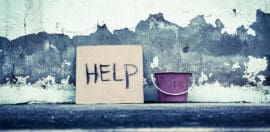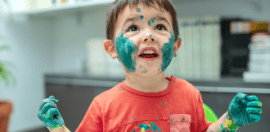COVID-19 is the impetus we needed to level up child welfare

15 December 2021 at 3:37 pm
It is our role – as adults, parents, carers, and community members – to support children and young people to thrive, through the good and the bad, writes Deb Tsorbaris, CEO of the Centre for Excellence in Child and Family Welfare.
As the year winds down and the festivities ramp up, I find myself reflecting on what the year has meant for our sector, and in particular, how its many twists and turns have impacted children and young people.
Thinking back to January, when we experienced a brief moment of normality, children were enjoying their summer holiday, unaware of how extraordinary and unpredictable the year ahead would be.
One defining feature of the year for children and young people was the stop-start approach to lockdowns that led to Victorians missing over two months of face-to-face teaching in 2021, in addition to the many months of online learning throughout 2020.
Whereas some children and young people were able to adapt to online learning, taking advantage of digital tools, online “tutoring” and the freedom of independent learning, many others who lacked such resources struggled to engage with online education in the same way. Evidence suggests that children experiencing disadvantage were disproportionately affected by the negative impact of online learning during the pandemic, and that the gap in educational attainment has widened as a result.
Across the board children and young people have reported increased psychological distress during the pandemic, but there are strong indications that the mental health impact of the pandemic weighed more heavily on young people experiencing disadvantage, such as young people in out-of-home care. This group typically also has more difficulties in accessing appropriate healthcare, highlighting the urgent need for comprehensive health assessments and follow up services for children entering and currently in care.
This great dividing effect of COVID-19 on children’s education and mental wellbeing is a reminder of the need for more equitable systems to put an end to intergenerational disadvantage and ensure a level playing field for all Victorian children.
As someone with a vested interest in the wellbeing of children and young people, something that struck me about the pandemic was that at times, there was a lack of empathy shown towards younger generations. The media narrative did not adequately address the experience of children and young people during this time, losing sight of what they have forgone as a result of the enduring yet necessary restrictions. There is now a golden opportunity for public policy to recognise the gaps that COVID-19 has widened and seek to find solutions to remedy them.
It has been a strange year for all Victorians, as we spent many months confined to our homes, experiencing prolonged periods of restrictions, to save lives. The warped version of the world that we have experienced since March 2020 is a transient, reactive place, saddled with uncertainty and rigidity. It is in this environment where today’s children are learning about their world, and we must acknowledge, validate and respond to their lived experience of the COVID age.
COVID-19 has shone a spotlight on disparities that we cannot ignore. In the midst of crisis, lies an opportunity to reimagine and rebuild a society that is consistently more inclusive, supportive and fair.
All over the word children are mobilising themselves to address the issues that impassion and enrage them. Action against climate change, racial justice, and the fight against inequality are movements with huge backing from children and young people, and now more than ever, society’s younger generations are demanding to be heard.
Despite their strength, we cannot be complacent. It is our role – as adults, parents, carers, and community members – to support children and young people to thrive, through the wonderful and difficult times in equal measure.
The last few years have been tough, and I am glad to see the back of 2021, as we enter the new year cautiously optimistic that a more inclusive, supportive and better world might be around the corner.







